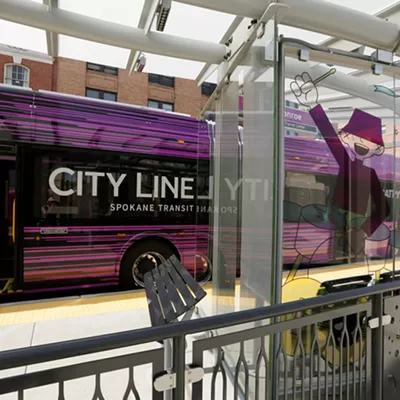"This came out of the blue," says Chief Allan, chairman of the Coeur d'Alene Tribal Council.
Late last week, southern Idaho Republican legislators published House Concurrent Resolution 35, which asks the state Attorney General to determine the constitutionality of Proposition One, the 2002 initiative passed by 60 percent of voters.
"This is the same folks over and over again," a frustrated Allan says. "It's all the [GOP] leadership, and they are all from down south. I don't think this is a revenue issue. What they've been saying forever is it's a moral issue against gaming."
GOP backers of HCR35 include House Speaker Bruce Newcomb, a farmer from Burley; Rep. John Stevenson, a farmer from Rupert; and Senate President pro tem Robert Geddes, an environmental engineer from Soda Springs.
They say it is as much an attack on Attorney General Lawrence Wasden as it is on Indian gaming. Still, the resolution came as a bad surprise.
"I wanted to be more proactive and open doors for communication," says Allan, elected tribal chairman last May. "I've gone down there [Boise] a lot, we have the Indian Affairs committee ... but maybe that's just window dressing."
Allan and North Idaho legislator Mike Jorgenson have become leaders on the Idaho Council on Indian Affairs, created in 1999 as a bridge between tribes and the legislature.
And yet, after back-to-back trips to Boise this session, Allan says, "We found out just like everybody else" that HCR35 had been drafted last week and was already up for a reading.
Allan sees it almost as a backstab that Newcomb and Geddes wouldn't bring the issue to the Indian Affairs group.
"Without a doubt, this is significant and important to all of our tribes in Idaho," Geddes says. He says HCR35 backers were concerned the issue would be stalled if it went to the Council on Indian Affairs.
"What we need to drive to ground is what is acceptable under our constitution and what isn't," he says.
Geddes says the Idaho constitution allows three types of gaming: bingo, the state lottery and pari-mutuel betting on horses and dogs. Tribal casinos with electronic gaming machines that are much like Vegas-style slot machines -- even though they pay out with a claim ticket instead of quarters -- are prohibited in Idaho, Geddes claims.
For years, the southern Idaho legislators have been asking AG Wasden to make a ruling to uphold either the passage of Proposition One or the state constitution, which are at odds, Geddes says.
That Wasden has been ducking the issue "is the opinion of some legislators, including myself," Geddes says. The resolution is "like a hanky in the wind saying, 'We need to do this.'"
Allan sees the question as moot. Four Idaho tribes have compacts with the state to allow casino gaming, using profits for schools and other services. The Coeur d'Alene Casino near Worley is the biggest, given its proximity to Spokane and Coeur d'Alene.
"It's time to move forward," Allan says. "We are getting ready to dole out another $1.3 million to education. The casino funds education and public safety -- it runs our essential government operations."















